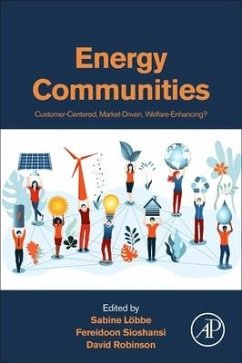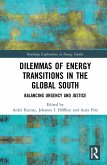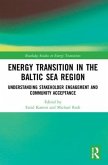Energy Communities
Customer-Centered, Market-Driven, Welfare-Enhancing?
Herausgegeben:Loebbe, Sabine; Sioshansi, Fereidoon; Robinson, David
Energy Communities
Customer-Centered, Market-Driven, Welfare-Enhancing?
Herausgegeben:Loebbe, Sabine; Sioshansi, Fereidoon; Robinson, David
- Broschiertes Buch
- Merkliste
- Auf die Merkliste
- Bewerten Bewerten
- Teilen
- Produkt teilen
- Produkterinnerung
- Produkterinnerung
Energy Communities explores core potential systemic benefits and costs in engaging consumers into communities, particularly relating to energy transition. The book evaluates the conditions under which energy communities might be regarded as customer-centered, market-driven and welfare-enhancing. The book also reviews the issue of prevalence and sustainability of energy communities and whether these features are likely to change as opportunities for distributed energy grow. Sections cover the identification of welfare considerations for citizens and for society on a local and national level,…mehr
Andere Kunden interessierten sich auch für
![Local Energy Communities Local Energy Communities]() Local Energy Communities43,99 €
Local Energy Communities43,99 €![Routledge Handbook of Energy Communities and Smart Cities Routledge Handbook of Energy Communities and Smart Cities]() Routledge Handbook of Energy Communities and Smart Cities245,99 €
Routledge Handbook of Energy Communities and Smart Cities245,99 €![Dilemmas of Energy Transitions in the Global South Dilemmas of Energy Transitions in the Global South]() Dilemmas of Energy Transitions in the Global South43,99 €
Dilemmas of Energy Transitions in the Global South43,99 €![Managing Digital Transformation Managing Digital Transformation]() Managing Digital Transformation70,99 €
Managing Digital Transformation70,99 €![Leadership Lessons for Health Care Providers Leadership Lessons for Health Care Providers]() Frank James LexaLeadership Lessons for Health Care Providers38,99 €
Frank James LexaLeadership Lessons for Health Care Providers38,99 €![Energy and Development Energy and Development]() Frauke UrbanEnergy and Development58,99 €
Frauke UrbanEnergy and Development58,99 €![Energy Transition in the Baltic Sea Region Energy Transition in the Baltic Sea Region]() Energy Transition in the Baltic Sea Region45,99 €
Energy Transition in the Baltic Sea Region45,99 €-
-
-
Energy Communities explores core potential systemic benefits and costs in engaging consumers into communities, particularly relating to energy transition. The book evaluates the conditions under which energy communities might be regarded as customer-centered, market-driven and welfare-enhancing. The book also reviews the issue of prevalence and sustainability of energy communities and whether these features are likely to change as opportunities for distributed energy grow. Sections cover the identification of welfare considerations for citizens and for society on a local and national level, and from social, economic and ecological perspectives, while also considering different community designs and evolving business models.
Produktdetails
- Produktdetails
- Verlag: Academic Press / Elsevier Science & Technology
- Artikelnr. des Verlages: C2021-0-01002-6
- Seitenzahl: 514
- Erscheinungstermin: 4. Juli 2022
- Englisch
- Abmessung: 228mm x 150mm x 30mm
- Gewicht: 828g
- ISBN-13: 9780323911351
- ISBN-10: 0323911358
- Artikelnr.: 63121014
- Herstellerkennzeichnung
- Libri GmbH
- Europaallee 1
- 36244 Bad Hersfeld
- gpsr@libri.de
- Verlag: Academic Press / Elsevier Science & Technology
- Artikelnr. des Verlages: C2021-0-01002-6
- Seitenzahl: 514
- Erscheinungstermin: 4. Juli 2022
- Englisch
- Abmessung: 228mm x 150mm x 30mm
- Gewicht: 828g
- ISBN-13: 9780323911351
- ISBN-10: 0323911358
- Artikelnr.: 63121014
- Herstellerkennzeichnung
- Libri GmbH
- Europaallee 1
- 36244 Bad Hersfeld
- gpsr@libri.de
Sabine Löbbe is a professor for energy economics and business administration in energy markets in the Reutlingen Energy Center for Distributed Energy Systems and Energy Efficiency at Reutlingen University, Germany. She is responsible for Sustainability in the President's Office at the University. Her consulting company advises utilities on strategy, business and organizational development. Prior to her current position, she was Director for Strategy and Business Development at the municipal utility swb AG Bremen. She also worked at Arthur D. Little Inc. in the Energy Practice and in the regional utility VSE AG. She wrote her doctoral dissertation about marketing strategies for utilities at Saarbrücken University. In her research and teaching, she focuses on the transition of organisations towards climate neutrality, business model development based on customer preferences regarding distributed energy, as well as organisational issues for bridging the energy efficiency gap.
Part 1: The Concept of Energy Communities and Their Regulatory Framework
1. A taxonomy of energy communities in liberalized energy systems
2. The EU policy framework for energy communities
3. Energy communities: A US regulatory perspective
4. Developing a legal framework for energy communities beyond energy law
5. Alignment of energy community incentives with electricity system benefits in Spain
6. The "virtual model for collective self-consumption in Italy
7. Energy Communities: A North American Perspective
8. Energy Communities: Challenges for Regulators and Policymakers
Part 2: The Appeal of Energy Communities to Customers and Citizens
9. What motivates private households to participate in energy communities? A literature review and German case study
10. Community energy initiatives as a space for emerging new imaginaries?
11. The construction of a citizen-centered ecosystem for renewable energies in France
12. Energy communities' social role in a just energy transition
Part 3: Enabling Technologies, Community Design, and Business Models
13. The path to energy communities via local energy management and digital customer care
14. Governing energy communities: The role of actors and expertise in business model innovation
15. Grid-friendly clean energy communities and induced intra-community cash flows through peer-to-peer trading
16. Italian Energy Communities from a DSO's Perspective
17. Community energy design models in Brazil: From niches to mainstream
18. Institutional and policy context of energy communities in France and Italy: How to increase the welfare-enhancing capacity of the sector
19. The digitalization of peer-to-peer electricity trading in energy communities
Part 4: Case Studies and Implementation
20. Enabling Business Models and Grid Stability: Case Studies from Germany
21. Energy communities in Europe: A review of the Danish and German experiences
22. Platform-based energy communities in Germany and their benefits and challenges
23. A community-based biomethane heat network:Case study from Trier
24. Establishing Energy Communities in Post-Communist States:The Case of Bulgaria
25. Sustainable island energy systems: A case study of Tilos island, Greece
1. A taxonomy of energy communities in liberalized energy systems
2. The EU policy framework for energy communities
3. Energy communities: A US regulatory perspective
4. Developing a legal framework for energy communities beyond energy law
5. Alignment of energy community incentives with electricity system benefits in Spain
6. The "virtual model for collective self-consumption in Italy
7. Energy Communities: A North American Perspective
8. Energy Communities: Challenges for Regulators and Policymakers
Part 2: The Appeal of Energy Communities to Customers and Citizens
9. What motivates private households to participate in energy communities? A literature review and German case study
10. Community energy initiatives as a space for emerging new imaginaries?
11. The construction of a citizen-centered ecosystem for renewable energies in France
12. Energy communities' social role in a just energy transition
Part 3: Enabling Technologies, Community Design, and Business Models
13. The path to energy communities via local energy management and digital customer care
14. Governing energy communities: The role of actors and expertise in business model innovation
15. Grid-friendly clean energy communities and induced intra-community cash flows through peer-to-peer trading
16. Italian Energy Communities from a DSO's Perspective
17. Community energy design models in Brazil: From niches to mainstream
18. Institutional and policy context of energy communities in France and Italy: How to increase the welfare-enhancing capacity of the sector
19. The digitalization of peer-to-peer electricity trading in energy communities
Part 4: Case Studies and Implementation
20. Enabling Business Models and Grid Stability: Case Studies from Germany
21. Energy communities in Europe: A review of the Danish and German experiences
22. Platform-based energy communities in Germany and their benefits and challenges
23. A community-based biomethane heat network:Case study from Trier
24. Establishing Energy Communities in Post-Communist States:The Case of Bulgaria
25. Sustainable island energy systems: A case study of Tilos island, Greece
Part 1: The Concept of Energy Communities and Their Regulatory Framework
1. A taxonomy of energy communities in liberalized energy systems
2. The EU policy framework for energy communities
3. Energy communities: A US regulatory perspective
4. Developing a legal framework for energy communities beyond energy law
5. Alignment of energy community incentives with electricity system benefits in Spain
6. The "virtual model for collective self-consumption in Italy
7. Energy Communities: A North American Perspective
8. Energy Communities: Challenges for Regulators and Policymakers
Part 2: The Appeal of Energy Communities to Customers and Citizens
9. What motivates private households to participate in energy communities? A literature review and German case study
10. Community energy initiatives as a space for emerging new imaginaries?
11. The construction of a citizen-centered ecosystem for renewable energies in France
12. Energy communities' social role in a just energy transition
Part 3: Enabling Technologies, Community Design, and Business Models
13. The path to energy communities via local energy management and digital customer care
14. Governing energy communities: The role of actors and expertise in business model innovation
15. Grid-friendly clean energy communities and induced intra-community cash flows through peer-to-peer trading
16. Italian Energy Communities from a DSO's Perspective
17. Community energy design models in Brazil: From niches to mainstream
18. Institutional and policy context of energy communities in France and Italy: How to increase the welfare-enhancing capacity of the sector
19. The digitalization of peer-to-peer electricity trading in energy communities
Part 4: Case Studies and Implementation
20. Enabling Business Models and Grid Stability: Case Studies from Germany
21. Energy communities in Europe: A review of the Danish and German experiences
22. Platform-based energy communities in Germany and their benefits and challenges
23. A community-based biomethane heat network:Case study from Trier
24. Establishing Energy Communities in Post-Communist States:The Case of Bulgaria
25. Sustainable island energy systems: A case study of Tilos island, Greece
1. A taxonomy of energy communities in liberalized energy systems
2. The EU policy framework for energy communities
3. Energy communities: A US regulatory perspective
4. Developing a legal framework for energy communities beyond energy law
5. Alignment of energy community incentives with electricity system benefits in Spain
6. The "virtual model for collective self-consumption in Italy
7. Energy Communities: A North American Perspective
8. Energy Communities: Challenges for Regulators and Policymakers
Part 2: The Appeal of Energy Communities to Customers and Citizens
9. What motivates private households to participate in energy communities? A literature review and German case study
10. Community energy initiatives as a space for emerging new imaginaries?
11. The construction of a citizen-centered ecosystem for renewable energies in France
12. Energy communities' social role in a just energy transition
Part 3: Enabling Technologies, Community Design, and Business Models
13. The path to energy communities via local energy management and digital customer care
14. Governing energy communities: The role of actors and expertise in business model innovation
15. Grid-friendly clean energy communities and induced intra-community cash flows through peer-to-peer trading
16. Italian Energy Communities from a DSO's Perspective
17. Community energy design models in Brazil: From niches to mainstream
18. Institutional and policy context of energy communities in France and Italy: How to increase the welfare-enhancing capacity of the sector
19. The digitalization of peer-to-peer electricity trading in energy communities
Part 4: Case Studies and Implementation
20. Enabling Business Models and Grid Stability: Case Studies from Germany
21. Energy communities in Europe: A review of the Danish and German experiences
22. Platform-based energy communities in Germany and their benefits and challenges
23. A community-based biomethane heat network:Case study from Trier
24. Establishing Energy Communities in Post-Communist States:The Case of Bulgaria
25. Sustainable island energy systems: A case study of Tilos island, Greece









